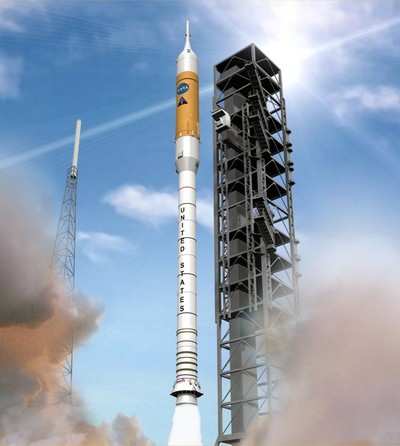Historian Says Russian Flights Preferable To Wasting Money,
Safety Risk
 Facing a dearth of resources
and the need to implement America's next-generation manned space
program, NASA needs to stop wasting money on the space shuttle and
devote its full resources to the Constellation program. That's the
opinion of noted space historian John Logsdon, who says the
benefits of retiring the shuttle fleet on-time in 2010 outweigh the
distasteful aspects of relying on Russia for space access over the
next five years.
Facing a dearth of resources
and the need to implement America's next-generation manned space
program, NASA needs to stop wasting money on the space shuttle and
devote its full resources to the Constellation program. That's the
opinion of noted space historian John Logsdon, who says the
benefits of retiring the shuttle fleet on-time in 2010 outweigh the
distasteful aspects of relying on Russia for space access over the
next five years.
In a Washington Post op-ed piece this week, Logsdon notes he was
part of the 2003 Columbia Accident Investigation Board... which
recommended the US replace the shuttle "as soon as possible."
"In practical terms, lacking any US-created alternative,
retiring the shuttle would mean relying on the Russian Soyuz
spacecraft to carry American astronauts to the space station for at
least four years," Logsdon writes. "NASA Administrator Mike Griffin
has described US dependence on Russia for transportation to space
as "unseemly." Indeed it is, but it is preferable to continuing to
fly the shuttle past 2010.
"Another accident could delay or even end the US program of
human spaceflight," he adds, noting NASA itself estimates the
chances of losing another shuttle crew in a catastrophic accident
at one-in-80. Those are perhaps mathematically acceptable odds when
only talking about the handful of remaining scheduled shuttle
flights... but "simply too high," Logsdon maintains, when talking
about adding 10 more flights over the next six years.
In addition to that admittedly emotional argument, Logsdon takes
a more pragmatic approach... noting the shuttle essentially takes
up unnecessary space when docked to the International Space
Station, that would be better utilized by a pair of Russian Soyuz
space capsules.
"Beginning next year, the International Space Station will have
a six-person crew that must be able to exit immediately as a safety
measure," he writes. "Two Soyuz spacecraft, which each carry three
people, need to be in place at the space station at all times. The
shuttle, never designed for long stays in space, is not able to
stay at the space station longer than a few weeks at a time; this
rules it out as a viable rescue option...
"The shuttle is also very expensive to operate; this year's
shuttle budget is close to $3 billion," Logsdon continues. "If the
United States continues to spend that money on flying the shuttle
beyond 2010, it will take even longer to develop a replacement
vehicle, further delaying US plans to venture beyond low Earth
orbit."
Current estimates from NASA state the first manned flight of an
Orion space capsule won't lift off until 2015,
as ANN has reported.
Logsdon admits the idea of the US relying on Russia space
capsules to journey to the ISS isn't an appealing one -- especially
now,
as the Russian bear appears to be stirring
anew -- but notes the decision has economic benefits,
as well as possible diplomatic incentives.

"This choice is made more complex by renewed Russian
assertiveness, as demonstrated by its incursion into disputed
Georgian territory in August," Logsdon says. "A decision not to use
Soyuz could increase tensions in other areas of the US-Russian
relationship. Should altering American plans to depend on the Soyuz
spacecraft be one of the ways in which the US government shows its
disapproval of Russian actions? I think not.
"The prudent choice here is to get on with current plans, which
call for a US-led international effort to return to the moon and
then prepare for voyages to Mars," Logsdon concludes. "This is a
smarter and more forward-looking decision than continuing to
operate a costly, flawed system. The space shuttle is a remarkable
technological achievement, but replacing it soon is the best path
to the future. We should not let false pride or international
tensions get in the way of an intelligent approach to exploring the
final frontier."

Logsdon's op-ed comes as the PBS series "Nova" premiered its
documentary "Space Shuttle Disaster," about the Columbia accident,
this week. The writer -- who holds the Lindbergh chair in aerospace
history at the National Air and Space Museum, and was former
director of George Washington University's Space Policy Institute
-- is featured on that program.
 Airborne-Flight Training 05.09.24: ERAU at AIAA, LIFT Diamond Buy, Epic A&P
Airborne-Flight Training 05.09.24: ERAU at AIAA, LIFT Diamond Buy, Epic A&P ANN's Daily Aero-Term (05.07.24): Hazardous Weather Information
ANN's Daily Aero-Term (05.07.24): Hazardous Weather Information Aero-News: Quote of the Day (05.07.24)
Aero-News: Quote of the Day (05.07.24) NTSB Final Report: Cessna 150
NTSB Final Report: Cessna 150 Aero-News: Quote of the Day (05.08.24)
Aero-News: Quote of the Day (05.08.24)





